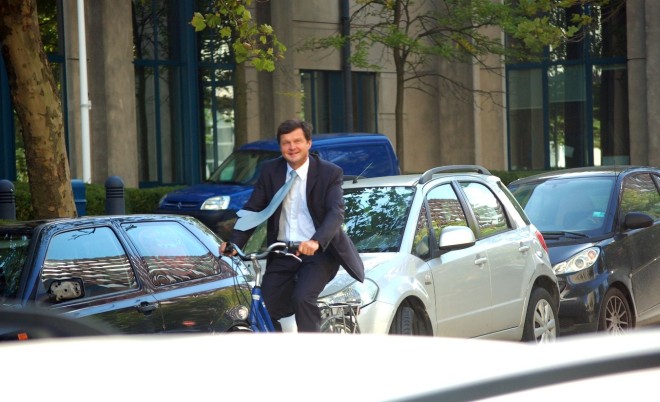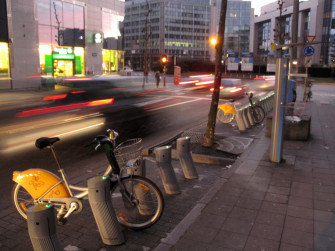
Bike To Work: A Chat With An EU Official
The European Commission recently joined Bike to Work and Filip Majcen, a Director at the Commission’s DG Translation, was among the first to sign up. In this interview he tells Tim Cooper from the European Union Cyclists' Group why, and what it would take to get him cycling even more often.
Note: This article originally appeared in DGT Monthly, the internal staff magazine of the European Commission’s Directorate-General for Translation, the world’s largest translation service, 1 October 2012.
Cycling has been my preferred way of moving around since my early days, not only because it is fun, but also because it is often the fastest and the most reliable way to get around. In addition, it makes me feel that I am doing something good for the environment and for myself. Nowadays, I cycle to work mainly in summer: there is less traffic and the weather is better. In other seasons, I usually come by train or by car. Now that I have joined Bike to Work I may try to cycle more often throughout the year.
When you’re indoors, weather conditions often look worse than they are. But once you get on your bike, you realise that a couple of drops of rain don’t really matter too much.
I often use a service bike when I go to meetings in other Commission buildings. They are good quality and well-maintained, but the procedure for borrowing them could be lighter and more flexible. When you’re in a hurry every minute counts!
We should be able to take a service bicycle home and bring it back the next day, or to use it for a lunch appointment, or when we need to get something done during the lunch break. It would be nice to re-think the procedure from the users’ perspective, because they’re the ones who know what works and what doesn’t.
The Villo city bikes, which we now have in rue de Genève, are perhaps a more flexible alternative, although I don’t know how good they are.
Showers in all buildings, including G-1, and a simplification of the procedure for their use would make cyclists’ lives easier, and would encourage more colleagues to come to work by bike more often.
Brussels traffic is not the safest, compared to some other cities where I have cycled, such as my home city, Ljubljana, or Munich, where the bike infrastructure is much better and the bike culture more developed. Luxembourg has come from behind, but has made quite an effort to improve conditions for cyclists over the last twenty years.
Brussels is definitely not the best place for inexperienced cyclists! You have to be very attentive to what’s going on around you. When you see a car turning right, never assume that the driver has checked his blind spot: maybe he has, maybe he hasn’t. Observing what’s going on and trying to anticipate what drivers will do is even more important than wearing a helmet and a reflective jacket! For those who lack experience or confidence when riding a bike and who would like to get used to cycling in the city, I can warmly recommend the guided tours organised by by Pro Velo. They are a good way to get used to cycling in the city, and at the same time to discover it from a different perspective.
Whether you already cycle to work regularly, or are tempted by the idea of doing so occasionally, I encourage you to register for Bike to Work (this link shows how): it’s an easy way to keep track of the number of times you cycle to work, the kilometres you cover and the calories you burn, and as a bonus there are some small gifts to reward you for the effort you have made.
About the Interviewee
Filip Majcen is the Director responsible for editing, web translation, localisation, library and terminology coordination activities in the European Commission's Directorate-General for Translation. Prior to joining the Commission in 2007, he worked in the financial services sector in Luxembourg. He studied international economic relations and international finance at the University of Ljubljana.
Contact the author
Recent news!
Upcoming events
Contact Us
Avenue des Arts, 7-8
Postal address: Rue de la Charité, 22
1210 Brussels, Belgium












